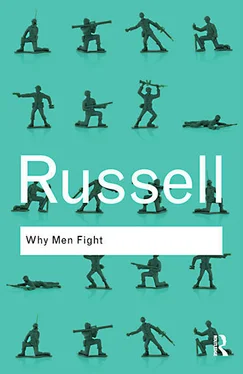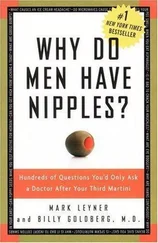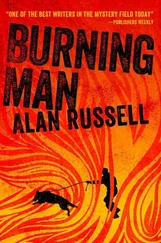Bertrand Russell - Why Men Fight
Здесь есть возможность читать онлайн «Bertrand Russell - Why Men Fight» весь текст электронной книги совершенно бесплатно (целиком полную версию без сокращений). В некоторых случаях можно слушать аудио, скачать через торрент в формате fb2 и присутствует краткое содержание. Город: London, Год выпуска: 2010, ISBN: 2010, Издательство: Routledge, Жанр: Философия, Публицистика, на английском языке. Описание произведения, (предисловие) а так же отзывы посетителей доступны на портале библиотеки ЛибКат.
- Название:Why Men Fight
- Автор:
- Издательство:Routledge
- Жанр:
- Год:2010
- Город:London
- ISBN:978-0-203-86469-2
- Рейтинг книги:3 / 5. Голосов: 1
-
Избранное:Добавить в избранное
- Отзывы:
-
Ваша оценка:
- 60
- 1
- 2
- 3
- 4
- 5
Why Men Fight: краткое содержание, описание и аннотация
Предлагаем к чтению аннотацию, описание, краткое содержание или предисловие (зависит от того, что написал сам автор книги «Why Men Fight»). Если вы не нашли необходимую информацию о книге — напишите в комментариях, мы постараемся отыскать её.
— discusses war, pacifism, reason, impulse and personal liberty, and greatly contributed to Russells fame as a formidable social critic and anti-war activist.
“The supreme principle, both in politics and in private life, should be to promote all that is creative, and so to diminish the impulses and desires that centre around possession.”
Bertrand Russell “Russell is one of the most profound thinkers of the modern age.”
The New York Times
Why Men Fight — читать онлайн бесплатно полную книгу (весь текст) целиком
Ниже представлен текст книги, разбитый по страницам. Система сохранения места последней прочитанной страницы, позволяет с удобством читать онлайн бесплатно книгу «Why Men Fight», без необходимости каждый раз заново искать на чём Вы остановились. Поставьте закладку, и сможете в любой момент перейти на страницу, на которой закончили чтение.
Интервал:
Закладка:
There can be no doubt that force employed according to law is less pernicious than force employed capriciously. If international law could acquire sufficient hold on men’s allegiance to regulate the relations of States, a very great advance on our present condition would have been made. The primitive anarchy which precedes law is worse than law. But I believe there is a possibility of a stage to some extent above law, where the advantages now secured by the law are secured without loss of freedom, and without the disadvantages which the law and the police render inevitable. Probably some repository of force in the background will remain necessary, but the actual employment of force may become very rare, and the degree of force required very small. The anarchy which precedes law gives freedom only to the strong; the condition to be aimed at will give freedom as nearly as possible to every one. It will do this, not by preventing altogether the existence of organized force, but by limiting the occasions for its employment to the greatest possible extent.
The power of the State is only limited internally by the fear of rebellion and externally by the fear of defeat in war. Subject to these restrictions, it is absolute. In practice, it can seize men’s property through taxation, determine the law of marriage and interitance, punish the expression of opinions which it dislikes, put men to death for wishing the region they inhabit to belong to a different State, and order all able-bodied males to risk their lives in battle whenever it considers war desirable. On many matters disagreement with the purposes and opinions of the State is criminal. Probably the freest States in the world, before the war, were America and England; yet in America no immigrant may land until he has professed disbelief in anarchism and polygamy, while in England men were sent to prison in recent years for expressing disagreement with the Christian religion [9] 1 The blasphemy prosecutions.
or agreement with the teaching of Christ. [10] 2 The syndicalist prosecutions. [The punishment of conscientious objectors must now be added, 1916.]
In time of war, all criticism of the external policy of the State is criminal. Certain objects having appeared desirable to the majority, or to the effective holders of power, those who do not consider these objects desirable are exposed to pains and penalties not unlike those suffered by heretics in the past. The extent of the tyranny thus exercised is concealed by its very success: few men consider it worth while to incur a persecution which is almost certain to be thorough and effective.
Universal military service is perhaps the extreme example of the power of the State, and the supreme illustration of then difference between its attitude to its own citizens and its attitude to the citizens of other States. The State punishes, with impartial rigour, both those who kill their compatriots and those who refuse to kill foreigners. On the whole, the latter is considered the graver crime. The phenomenon of war is familiar, and men fail to realize its strangeness; to those who stand inside the cycle of instincts which lead to war it all seems natural and reasonable. But to those who stand outside the strangeness of it grows with familiarity. It is amazing that the vast majority of men should tolerate a system which compels them to submit to all the horrors of the battlefield at any moment when their Government commands them to do so. A French artist, indifferent to politics, attentive only to his painting, suddenly finds himself called upon to shoot Germans, who, his friends assure him, are a disgrace to the human race. A German musician, equally unknowing, is called upon to shoot the perfidious Frenchman. Why cannot the two men declare a mutual neutrality? Why not leave war to those who like it and bring it on? Yet if the two men declared a mutual neutrality they would be shot by their compatriots. To avoid this fate they try to shoot each other. If the world loses the artist, not the musician, Germany rejoices; if the world loses the musician, not the artist, France rejoices. No one remembers the loss to civilization, which is equal whichever is killed.
This is the politics of Bedlam. If the artist and the musician had been allowed to stand aside from the war, nothing but unmitigated good to mankind would have resulted. The power of the State, which makes this impossible, is a wholly evil thing, quite as evil as the power of the Church which in former days put men to death for unorthodox thought. Yet if, even in time of peace, an international league were founded to consist of Frenchmen and Germans in equal numbers, all pledged not to take part in war, the French State and the German State would persecute it with equal ferocity. Blind obedience, unlimited willingness to kill and die, are exacted of the modern citizens of a democracy as much as of the Janizaries of mediæval sultans or the secret agents of Oriental despots. [11] 3 “In a democratic country it is the majority who must after all rule, and the minority will be obliged to submit with the best grace possible” ( Westminster Gazette on Conscription, December 29, 1915).
The power of the State may be brought to bear, as it often is in England, through public opinion rather than through the laws. By oratory and the influence of the Press, public opinion is largely created by the State, and a tyrannous public opinion is as great an enemy to liberty as tyrannous laws. If the young man who will not fight finds that he is dismissed from his employment, insulted in the streets, cold-shouldered by his friends, and thrown over with scorn by any woman who may formerly have liked him, he will feel the penalty quite as hard to bear as a death sentence. [12] 4 “Some very strong remarks on the conduct of the ‘white feather’ women were made by Mr. Reginald Kemp, the Deputy Coroner for West Middlesex, at an inquest at Ealing on Saturday on Richard Charles Roberts, aged thirty-four, a taxicab driver, of Shepherd’s Bush, who committed suicide in consequence of worry caused by his rejection from the Army and the taunts of women and other amateur recruiters. It was stated that he tried to join the Army in October, but was rejected on account of a weak heart. That alone, said his widow, had depressed him, and he had been worried because he thought he would lose his licence owing to the state of his heart. He had also been troubled by the dangerous illness of a child. A soldier relative said that the deceased’s life had been made ‘a perfect misery’ by women who taunted him and called him a coward because he did not join the Army. A few days ago two women in Maida Vale insulted him ‘something shocking.’ The Coroner, speaking with some warmth, said the conduct of such women was abominable. It was scandalous that women who knew nothing of individual circumstances should be allowed to go about making unbearable the lives of men who had tried to do their duty. It was a pity they had nothing better to do. Here was a man who perhaps had been driven to death by a pack of silly women. He hoped something would soon be done to put a stop to such conduct” ( Daily News , July 26, 1915).
A free community requires not only legal freedom, but a tolerant public opinion, an absence of that instinctive inquisition into our neighbours’ affairs which, under the guise of upholding a high moral standard, enables good people to indulge unconsciously a disposition to cruelty and persecution. Thinking ill of others is not in itself a good reason for thinking well of ourselves. But so long as this is not recognized, and so long as the State can manufacture public opinion, except in the rare cases where it is revolutionary, public opinion must be reckoned as a definite part of the power of the State.
The power of the State outside its own borders is in the main derived from war or the threat of war. Some power is derived from the ability to persuade its citizens to lend money or not to lend it, but this is unimportant in comparison with the power derived from armies and navies. The external activity of the State—with exceptions so rare as to be negligible—is selfish. Sometimes selfishness is mitigated by the need of retaining the goodwill of other States, but this only modifies the methods employed, not the ends pursued. The ends pursued, apart from mere defence against other States, are, on the one hand, opportunities for successful exploitation of weak or uncivilized countries, on the other hand, power and prestige, which are considered more glorious and less material than money. In pursuit of these objects, no State hesitates to put to death innumerable foreigners whose happiness is not compatible with exploitation or subjection, or to devastate territories into which it is thought necessary to strike terror. Apart from the present war, such acts have been performed within the last twenty years by many minor States and by all the Great Powers [13] 5 By England in South Africa, America in the Philippines, France in Morocco, Italy in Tripoli, Germany in South-West Africa, Russia in Persia and Manchuria, Japan in Manchuria.
except Austria; and in the case of Austria only the opportunity, not the will, was lacking.
Интервал:
Закладка:
Похожие книги на «Why Men Fight»
Представляем Вашему вниманию похожие книги на «Why Men Fight» списком для выбора. Мы отобрали схожую по названию и смыслу литературу в надежде предоставить читателям больше вариантов отыскать новые, интересные, ещё непрочитанные произведения.
Обсуждение, отзывы о книге «Why Men Fight» и просто собственные мнения читателей. Оставьте ваши комментарии, напишите, что Вы думаете о произведении, его смысле или главных героях. Укажите что конкретно понравилось, а что нет, и почему Вы так считаете.












